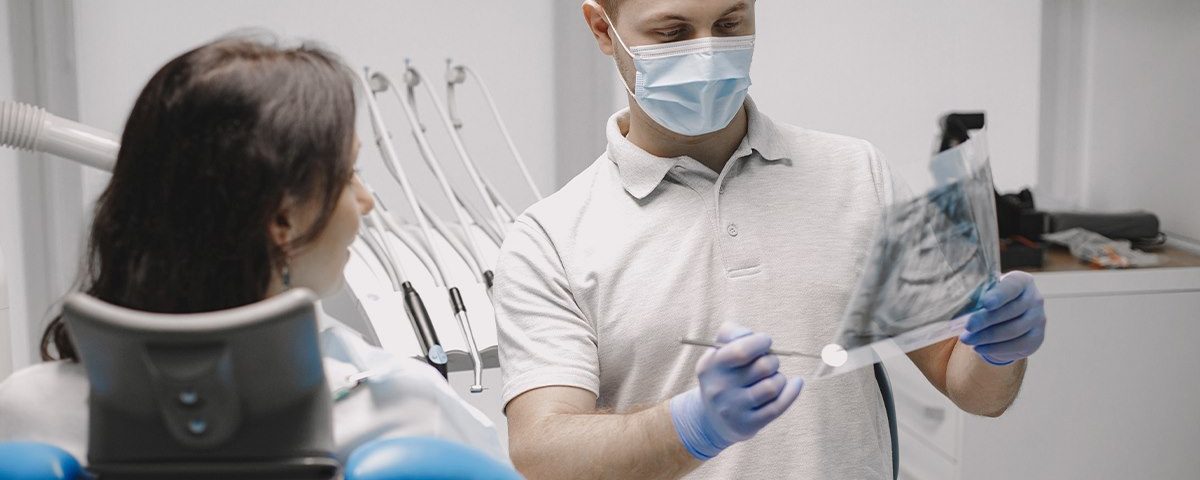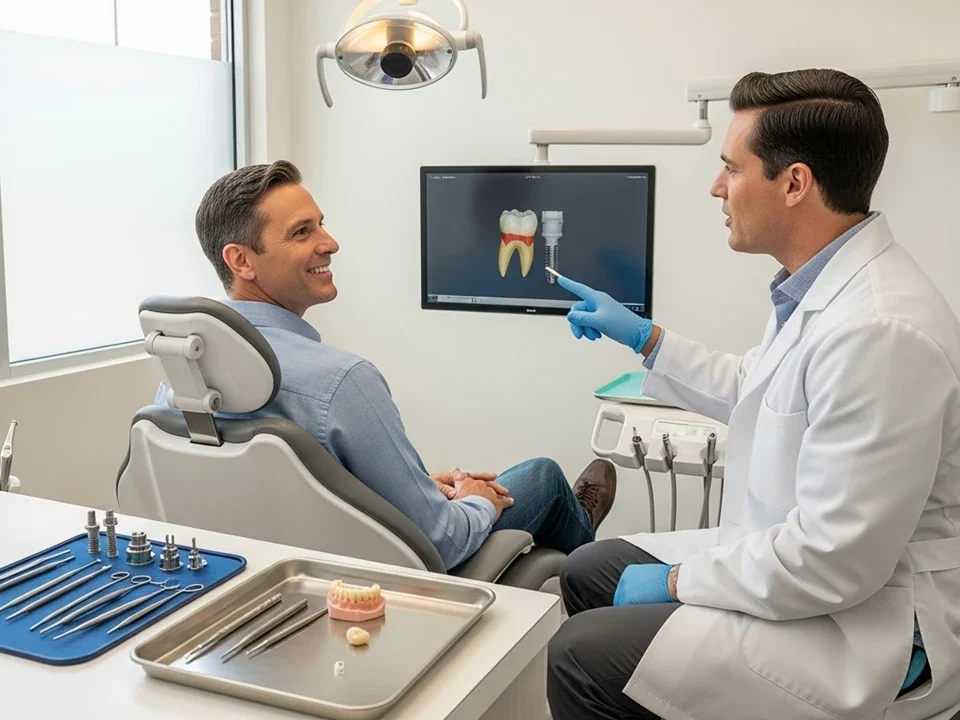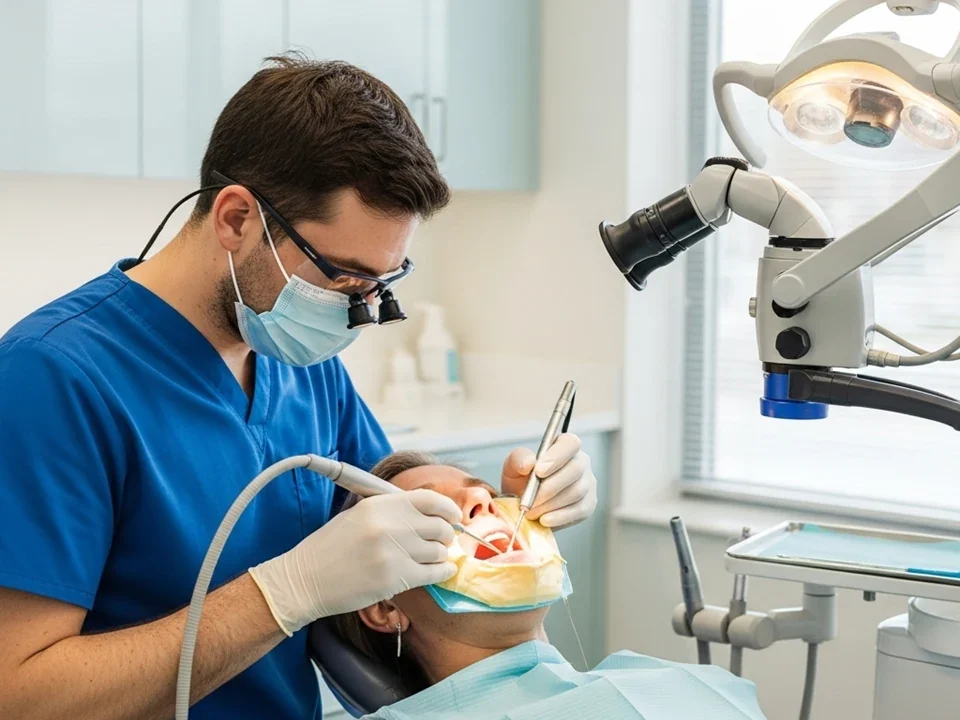
6 Benefits of Drill-Free Fillings for Kids and Adults
May 1, 2025
The Difference Between Regular Dental Cleaning and Deep Cleaning
May 8, 2025A dental implant can feel just like a real tooth. It makes eating and smiling easy again. But sometimes, problems can happen when you do not expect them. You might feel pain, notice the implant moving, or see changes around it. This can feel upsetting, but there is a way to fix it. Dental implant replacement can solve the problem early and keep your mouth healthy. This guide will show you when you might need to repair or replace your implant and how to protect it for the future.
Table of Contents
ToggleShould I Repair or Replace a Failed Dental Implant?
Not every implant issue needs a full dental implant replacement. If the crown breaks but the implant post stays strong, the dentist can repair it. If the implant feels loose or the bone around it shrinks, full dental implant replacement becomes necessary.
A dentist needs to check your implant with an exam and X-rays. After checking, the dentist will decide if a repair or replacement is the best choice.
Click Here to Learn More about Dental Prosthetist Avondale, AZ
6 Signs You Need Implant Replacement or Repair
Finding problems early keeps your mouth healthy. Sometimes, a small repair can fix the issue. Other times, you may need a full dental implant replacement. Here are the signs to watch for:
Persistent Pain or Discomfort
Pain after surgery is normal for a short time. If pain comes back long after healing, it shows something is wrong. It might mean infection, bone loss, or that the implant has moved. In most cases, ongoing pain means you will need dental implant replacement to fix the problem and protect nearby teeth.
Loose or Wobbly Implant
A strong implant stays still, just like a real tooth. If it moves when you chew or touch it, the bone around it may have weakened. A loose implant usually means you need a full dental implant replacement. Repair is not enough if the implant no longer holds firmly in the bone.
Gum Recession or Swelling Around the Implant
Healthy gums stay tight around your implant. If your gums look swollen, red, or start to pull back, it often means infection or bone loss. If gum problems are caught early, the best dentist in Avondale might repair the area with special cleaning or treatment. But if the damage is serious, you will likely need dental implant replacement to save your oral health.
Difficulty Chewing or Biting
Chewing should feel easy after the implant heals. If it hurts or feels strange when you bite down, your implant might be failing. If the problem is with the crown (the top part), a simple repair could fix it.
If the implant itself has become loose or damaged, you will need a dental implant replacement to restore your normal chewing.
Visible Damage to the Crown or Implant
Cracks, chips, or breaks in the crown are easy to spot. A small crack might just need a new crown, which is a simple repair. But if the damage reaches the implant under the crown, a full dental implant replacement may be needed to prevent infection and bigger problems.
Unusual Taste or Bad Breath
A bad taste that does not go away or breath that smells bad often means an infection around the implant. Infections can grow fast and cause bone loss. If caught early, cleaning and treatment might repair the area. If the infection has caused a lot of damage, you will need dental implant replacement to fully fix the problem.
Why Dental Implant Replacement Matters?
Dental implant replacement is important because it keeps your mouth healthy and your smile strong. If an implant is broken or loose, it can cause bigger problems if not treated. Here are some simple reasons why dental implant replacement matters:
- Stops pain and discomfort.
- Prevents infections that can harm other teeth.
- Protects your jawbone from getting weaker.
- Makes eating and speaking easier.
- Keeps your smile looking natural and healthy.
How to Prevent Dental Implant Issues?
Taking care of your implant every day helps it stay strong. Good habits can stop problems and help you avoid dental implant replacement. Here is an easy guide:
| What to Do | Why It Is Important |
| Brush your teeth two times a day | It keeps your implant clean and healthy |
| Use floss made for implants | It cleans spots your brush cannot reach |
| Visit the dentist in Avondale, AZ, every six months | It helps to find small problems before they get bigger. |
| Do not smoke | It keeps your gums and bones strong. |
| Wear a mouthguard at night | It protects your implant from damage |
| Eat healthy foods | It makes your bones and gums stronger |
Dental Implant Replacement in Avondale, AZ
At Desert Lake Family Dentistry, we help you with dental implant replacement. If your implant is broken, loose, or painful, our team can fix it. We work carefully to remove the old implant and place a new, strong one. Our dental prosthetist Avondale, AZ, makes sure you feel safe and comfortable during every step. At Desert Lake, we are here to protect your smile and keep your mouth healthy.
Let’s Recap
Dental implants make your smile better and help you enjoy life. If an implant fails, fixing it quickly can prevent bigger problems. Dental implant replacement can restore your mouth’s health and keep your teeth strong. A trained dentist will check your implant carefully and choose the best way to repair or replace it. Taking action early protects your teeth, gums, and jawbone. If you notice a problem, do not wait to get help.
FAQs
What Are the Causes of Dental Implant Failure?
Common reasons include infection, bone loss, injury, poor oral hygiene, and weak implant placement.
Will Your Dental Implant Replacement Be Successful?
Most dental implant replacement procedures succeed, with success rates as high as 95% when done early by skilled dentists.
Can a Surgeon Repair Your Failed Implant?
Yes, a surgeon repairs some implant issues without full replacement.
Is dental implant replacement painful?
Most patients feel little to no pain during the replacement because dentists use numbing medicine.
Can all failed implants be replaced?
In most cases, yes. If there is enough healthy bone and gum tissue, a new implant can be placed.





